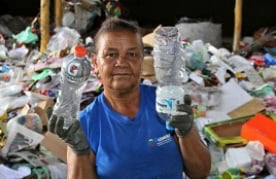Territorial dynamics of waste collecting and recycling: Experience exchange and innovative solutions
-
December 9, 2019 - December 13, 2019
- Hanoi, Vietnam

Experts gathered in Hanoi to exchange experiences and research results concerning the issues of waste collecting and recycling in Indonesia, India, Brazil and Vietnam.
Sonia Dias, the waste sector specialist from WIEGO’s Urban Policies Programme, participated as an expert advisor. She joined representatives from state agencies, research institutions, universities, international organizations and NGOs that work in the field will all participate.
Sonia spoke to findings of the Informal Economy Monitoring Study, a 10-city study that offered insight into the grounded reality of waste pickers, street/market traders and home-based workers, including their contributions, challenges, and how governments and other players help and hinder their work. Her remarks focused on the Waste Pickers in Belo Horizonte, Brazil.
She also highlighted other WIEGO projects that used participatory methodologies as they developed interventions to improve lives and livelihoods for waste pickers. These include the Cuidar Project (focused on health issues) and the Gender and Waste Project. She emphasized that inclusive cities need to be gender-sensitive in urban planning and design. Greater access to public space ensures informal women workers’ livelihoods and increases prospects for their economic empowerment.
Exchanges like this one in Vietnam help to build the knowledge base and understanding of the threats, opportunities and trends in the waste sector. As part of this, WIEGO believes it is crucial to ensure the contributions of the urban informal economy are highlighted.
Waste Pickers and Cities by Sonia M. Dias in Environment and Urbanization (2016)
Informal Economy Monitoring Study Sector Report: Waste Pickers by Sonia M. Dias, Melanie Samson